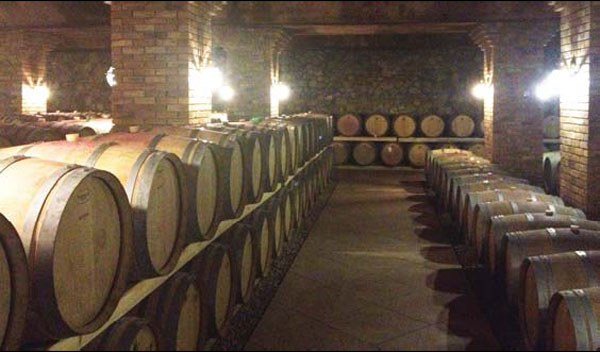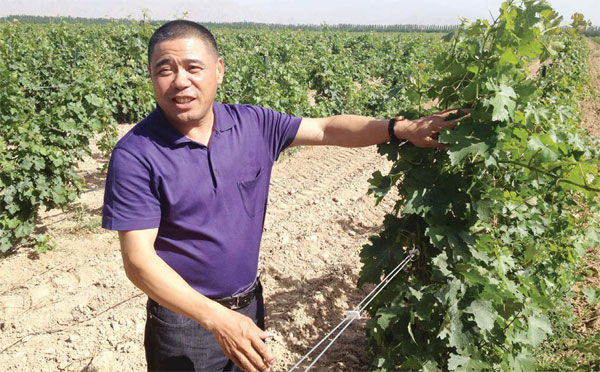Ningxia's wineries add some sparkle
Updated: 2013-08-23 08:08
By Zhong Nan and Li Fangfang (China Daily)
|
|||||||||||
|
Above: Chen Deqi says Daysun group will invest 1 billion yuan to build new chateaus and a new vineyard in Yinchuan in six years. Below: Yinchuan has attracted plenty of investment in its wine-making center at the foot of Helan Mountain. Photos by Zhong Nan / China Daily |

Yinchuan city is making the most of an ideal climate to attract major investment in its winemaking industry
Yinchuan, capital of Ningxia Hui autonomous region, might soon be known as the sparkling wine capital of China.
With the Chinese wine market booming, Yinchuan has attracted considerable investment in its winemaking center at the foot of Helan Mountain. French company Moet Hennessy even says it will have a locally produced premium sparkling wine on Chinese shelves some time next year.
With its strong sunshine, low rainfall and huge day-night temperature differences, this area in the northwest of the country is already among China's major wine production bases, which include Yantai and Changli. The Yinchuan vineyards have alluvial soil, which has been washed down from the mountains to the foothills and plains. It consists of sand, schist and small pebbles.
The Yellow River runs through the area and there are also many lakes, so there are no problems with water supply and irrigation.
Ningxia Daylong Winery Co Ltd, a subsidiary of Thailand's Daysun Group based in Bangkok, has increased its investment in Ningxia as part of a strategy to expand its presence in China.
Daylong Winery currently has a grape-planting base of 6,670 hectares with all the grafted seedlings coming from France and Italy. To ensure quality, the planting is limited to 3,300 plants a hectare, and the maximum output is set at about 7,500 kilograms a hectare.
Since founding its first winery in Yinchuan in 2008, the Thai company has invested 600 million yuan ($98 million; 74 million euros) to develop its wine business in the region.
"We will invest 1 billion yuan in our winery over the next six years," says Chen Deqi, president of Daysun Group and a Thailand-born Chinese. "The money will be spent on adding more breeding parks for improving seed, logistics facilities, machinery, a shelter forest belt, new chateaus and a new vineyard covering 6,600 hectares."
Daylong's cellar, which is 5 meters underground and covers 5,200 square meters, holds more than 700 oak barrels imported from France. These barrels cost between 9,000 and 20,000 yuan each.
Guided by seven French winemakers, the grapes are crushed, fermented, bottled and stored before going on sale. It takes 10 to 18 months' storage in a cellar for the bitterness to go out of the wine.
Chen, 57, says the quality of wine depends largely on the quality of the grapes. Helan Mountain stands at a latitude of about 38 degrees north, similar to Bordeaux in France. Its advantageous natural conditions add to the competitiveness of its local wine industry.
The company employs 860 people at its vineyards and exports its wine to Poland, Ukraine and South Korea.
To further develop the wine-making industry, the Yinchuan government plans to develop 10 high-quality cellars in the area. This year it also plans to build a large experimental zone as well as an international wine museum, according to supporting policies.
The grape-planting area stands at 34,000 hectares across the region. A total of 77 winemaking businesses have been established in the city, with production capacity reaching about 179,000 tons. Most of them have developed key components in the industry's supply chain, including fermenting, storage and bottling.
An additional 4,000 hectares of vineyards will be planted in Yinchuan this year, according to the Ningxia Forestry Bureau.
Another encouraging sign of growth in domestic wine consumption occurred in China's second and third-tier markets last year, when sales of Chinese wines overtook sales of foreign wines for the first time, both by volume and value. Total revenue from sales of Chinese wines reached $129 million in second and third-tier cities in 2012, according to a report by the China Alcoholic Drinks Association in Beijing.
Yuan Hong, general manager of Yinchuan Yuma Winery Co Ltd, another large winery in Yinchuan specializing in producing cabernet sauvignon and merlot, says his company is preparing to open a grand chateau-style winery and visitors' center next year, as part of the company's promotional strategy.
"It is important for us to quickly step up promotional and marketing activities and thereby garner more customers throughout China, because the country does not have a wine tradition," says Yuan.
"I began producing wine in 2005. Many wineries in China are modeled on French wine, but I don't follow this. Chinese winemakers need to pay more attention to developing their own winery culture, otherwise the products they sell will always be cheaper than imported wine even though some foreign wines taste quite flat."
To improve grape quality, Yuan's company also provides contracted farmers with technical know-how and instructions.
"Local farmers tend to sell us the best grapes because our prices are based on sugar content - prices for grapes that are rich in sugar are higher than the market standard," Yuan says.
With prices ranging from 300 yuan to 1,200 yuan a bottle, the company's sales revenue reached 82 million yuan in 2012, a 13 percent increase from a year earlier. China's western region is its main market.
China's major winemakers - such as Changyu Pioneer Wine Co Ltd, China Great Wall Wine Co Ltd and Dynasty Fine Wines Group Ltd - have all set up production bases in Yinchuan to diversify their products. Four wineries in this area are either foreign-owned or joint ventures.
In Yinchuan two months ago, Moet Hennessy, the wine and spirits unit owned by French luxury group LVMH, announced it would establish the first winery in China dedicated to the production of premium sparkling wine. Its first bottle of sparkling wine will be released in 2014.
"The winery will not only help support our group's overall business in China in the future," said Christophe Navarre, chief exexecutive of Moet Hennessy, "but it also indicates our long-term vision for the China market."
Close to Helan Mountain with an operational area of 6,300 sq m, the winery will follow the company's worldwide procedures to ensure it produces quality sparkling wines.
Mark Bedingham, the managing director of Moet Hennessy Asia Pacific, says the sparkling wine produced in Yinchuan will initially satisfy local demand but will eventually be exported.
"The wine market in China is booming," says Bedingham. "The new winery indicates another significant milestone in Moet Hennessy's continued efforts to help develop wine in China.
"New products are targeted at China's young consumers who aspire to a high-quality lifestyle.
"In most of the world's major wine markets, sparkling wine accounts for just 0.9 to 3 percent of total demand. But 1 percent of China's wine market, which is still increasing, is a really big number."
Indeed, China is on track to become the seventh-largest wine consumer in the world this year, after countries including the United States, France, Italy and Spain.
Chinese consumption is expected to rise 32 percent to about 1.3 billion bottles from 2009 figures, said a report by Vinexpo, an organization that hosts international wine and spirits trade exhibitions in France.
Contact the writers through zhongnan@chinadaily.com.cn
(China Daily European Weekly 08/23/2013 page19)
Today's Top News
List of approved GM food clarified
ID checks for express deliveries in Guangdong
Govt to expand elderly care
University asks freshmen to sign suicide disclaimer
Tibet gears up for new climbing season
Media asked to promote Sino-Indian ties
Shots fired at Washington Navy Yard
Minimum growth rate set at 7%
Hot Topics
Lunar probe , China growth forecasts, Emission rules get tougher, China seen through 'colored lens', International board,
Editor's Picks

|

|

|

|

|

|






